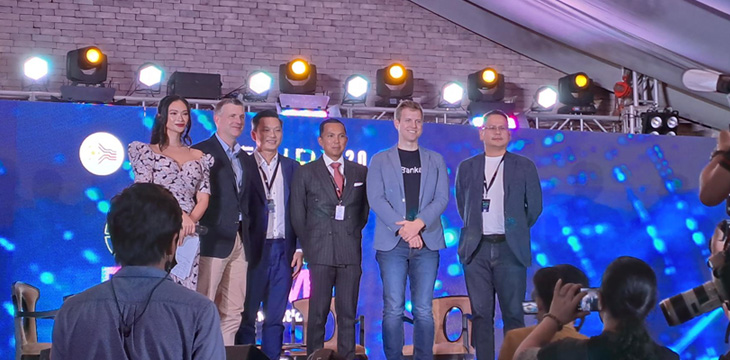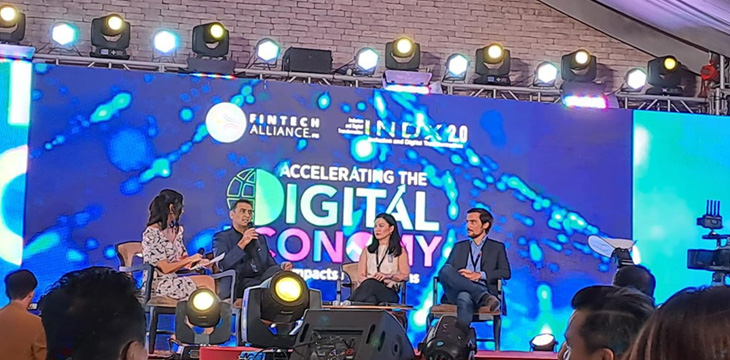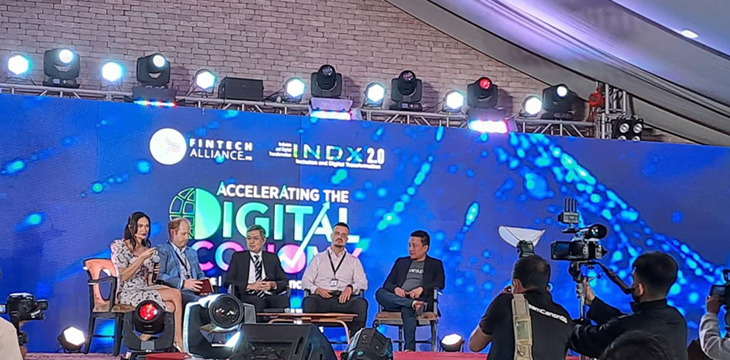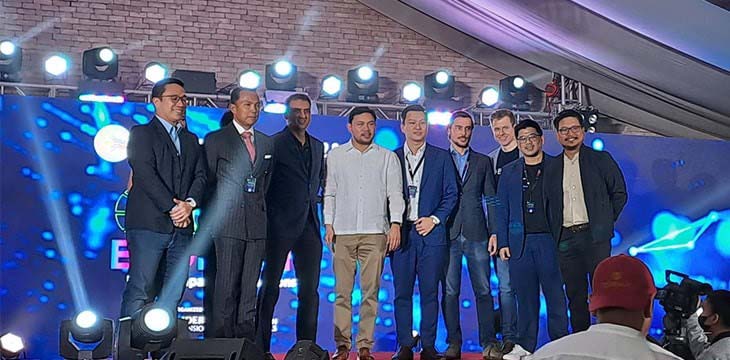|
Getting your Trinity Audio player ready...
|
From artificial intelligence and metaverse, all the way to the basics of digital currencies and potential of fintech—these were the highlights of Day 2 of the INDX Summit 2022 at the Enderun Tent, Taguig City, which took place on November 23.
The Philippines has been pushing for the adoption of blockchain technology in an attempt to spur innovation and revive its ailing economy that was severely hit by the coronavirus pandemic, which according to former Department of Public Works and Highways Secretary and Senator Mark Villar, helped propel the country to innovation despite the adversities it brought to the healthcare industry.
“The pandemic has revealed and brought urgency to necessary reforms in public health, the social safety net, disaster response, and rural development, among others,” he said in his welcome speech. “But what reinforced all these reforms is the digital imperative (that) going digital is the way, and it is the key.”
For industry players, incorporating distributed ledger technology in services and day-to-day activities will put the Philippines at the forefront of tech innovation while helping bring a solution to common problems the country faces. But blockchain is not the only technology to focus on, with the shadows of fintech and even the highly volatile and speculative market of virtual currencies lurking around, promising to change the finance industry and attain what global leaders have been trying to get a hold of—financial inclusion.
Entrepreneurs and thought leaders invited to speak at the high-level event all agreed that to achieve financial inclusion in the Philippines, the country must focus on reinforcing three things: education, talent pool, and partnerships.
Moving into a cash-lite economy
Countries from all corners of the world have been ramping up their digital transformation, and the Philippines refused to be left behind. While the pandemic unraveled the poor state of the country’s health sector, it provided a silver lining for the fintech industry—fueling digital transactions, the adoption of cashless payments, and the introduction of open finance.
Brankas Co-founder and CEO Todd Schweitzer noted that one of the underappreciated features of open finance is that it offers less reliance on traditional banks to build their own digital apps, which he claimed, the local banking sector is not entirely good at.

Schweitzer was speaking in a panel consisting of General Manager of International Business of Digital Technologies in Ant Group Derrick Loi, Gorriceta Africa Cauton and Saavedra Managing Partner Attorney Mark Gorriceta, and Open Banking Exchange and Europe Managing Director John Broxis.
“That’s where the real innovation is,” Schweitzer said, stressing the efficiency that open finance provides, adding that this latest technology targets the 78% of unbanked Filipinos that traditional banks couldn’t.
Maya Philippines Chief Strategy Officer Paolo Azzola, meanwhile, recounted his first journey in the Philippines in 2015, where 99% of Filipinos use physical cash to pay for their goods and services, while only one percent utilize digital transactions.
Citing previous estimates, Azzola said the Philippines “have come a long way” in adopting digital payments, with 20% of the population using cashless transactions in 2020. He further projects the figure to go up to 50% by 2023.
“This all might sound like statistics that are easy to get to, but it did take a very significant amount of work (and) collaboration with financial institutions, banks, as well as, of course, regulators,” he pointed out.
PayMongo Chief Operating Officer and Acting CEO Isabel Radid acknowledged that the pandemic served as an avenue to introduce Filipinos to mobile wallets but stressed that the rapid increase in digital payments is likely due to cashless transactions providing less friction, with many sticking to the use of e-wallets even after pandemic restrictions were eased.
UNO Digital Bank Founder and Chief Executive Officer Manish Bhai said these developments had showcased the positive effects of digitalization.
“Digitalization is not just for the sake of digitalization. Digitalization has no meaning if it doesn’t have efficiency; economic benefits,” Bhai said.
On the concept of how cashless payments help build financial inclusion, Azzola said moving to digital transactions provides Filipinos access to credit and a secure environment where they can safely invest, highlighting the tragedy that happened to the province of Tacloban where savings of many locals using paper money were reduced to ashes following a calamity.
While fintech is gradually booming, questions arise about whether traditional banks can keep up with the competition or will it soon be a thing of the past as open finance enters the scene. But Radid said that while the popularity of digital banks is gaining traction, she believes that the two entities will continue to coexist.

“The lines between digital and traditional banks are beginning to blur. It’s up to fintech companies and traditional banks to continue collaborating towards financial and digital inclusion.”
Dr. Roberto Martin Galang, dean of John Gokongwei School of Management at the Ateneo de Manila University, in a separate panel, also addressed this matter, claiming that traditional banks remain essential to the fintech industry to this day.
“We all believe that financial inclusion or fintech is a one-way street. The moment you try the latest app, the moment you done a digital payment, the moment that you done mobile banking, you’d never step foot in the bank again, but that’s not true. Because there are costs involved, there are learning curves involved, there are trustees involved, and as an educational institution, we want to understand banks. Because not only do we want to create the skillset of the future, we also want to understand the paying points of the consumer—of the industry—so that we can really promote a more inclusive financial sector,” said Galang.
Education remains primary key to inclusivity
According to World Population Review, the Philippines has a staggering 96.62% literacy rate in 2022, only 0.15% short compared with its neighbor Singapore. The figure, while considered a feat for a developing country, overshadows the overall educational situation in the Philippines, where the number of out-of-school youths (OSYs) has been snowballing since the pandemic.
Data from the Philippine Statistics Authority (PSA) in 2017 showed that nine percent, or 3.53 million Filipinos aged 6 to 24 years old, were considered OSYs. This figure ballooned to 16.9% in January 2020 and peaked at 25.2% in April of the same year, according to a study by the United Nations Children’s Fund.
And despite a billion-dollar budget for the educational sector, the Philippines was lowest in the educational ranking with its Southeast Asian neighbors in a 2019 poll conducted by the Organization for Economic Cooperation and Development (OECD), painting a grim picture of how the country, touted for its proficiency in English, is unable to keep up with the rest of the world.
INDX panelists all agree that this is a cause for concern, noting that without proper education, despite Filipinos being digitally literate and adoptive, financial inclusion won’t be achieved without financial literacy, which is only possible through proper education.
To address this, while ensuring that the country’s tech talent remains high, Galang said academes have to upgrade their curriculum and craft programs to improve the technical skills of students and cater to the growing demands of youths getting into the STEM (Science, technology, engineering, and mathematics) field.
“Tech, (and) finance is here to stay,” said Galang, adding that his team is looking for partnerships with the private sector to provide and expand financial inclusion in the community.
For The World Bank Senior Financial Sector Specialist Radu Tatucu, improving the educational sector will have a positive ripple effect and will open better job opportunities among Filipinos and improve the state’s competitiveness in whatever industry.
Notice the soft skills, not always the hard
But Coins.ph President and Chief Executive Officer Wei Zhou pointed out that the country must also improve the way it screens its talents, as businesses focus more on hiring workers that have strong technical skills while often leaving behind people who are not powerful on the tech side.
“What we need is to actually upgrade the people that actually work on those buildings to be much more entrepreneurial, to be much more actually driven,” Wei said, referring to employers in big financial institutions. He added that changing the mindset of the local workforce will drive the wave of the digital economy in the Philippines.

Zhou earned the nod from fellow panelists Finscore Country Manager and Chief Operations Officer Christo Georgiev, Galang, and Tatucu on the need to upskill workers and fine-tune their abilities to keep up with the rapidly changing industry.
Georgiev added that businesses should strengthen their people’s soft skills, which are often overlooked, stressing that these abilities would help build bridges between the community, organizations, the public and private sectors, and the government.
Azzola earlier mentioned that the Philippines has an abundant pool of talent, excelling in various industries, but Tatucu said the lack of opportunities and poor work-life living in the country are forcing local talents to search for greener pastures outside the region, which the national government, in collaboration with fintech companies, should work on improving.
Watch: ‘We’re probably number one globally in blockchain’: Inside the Philippine Fintech Festival

 02-24-2026
02-24-2026 




